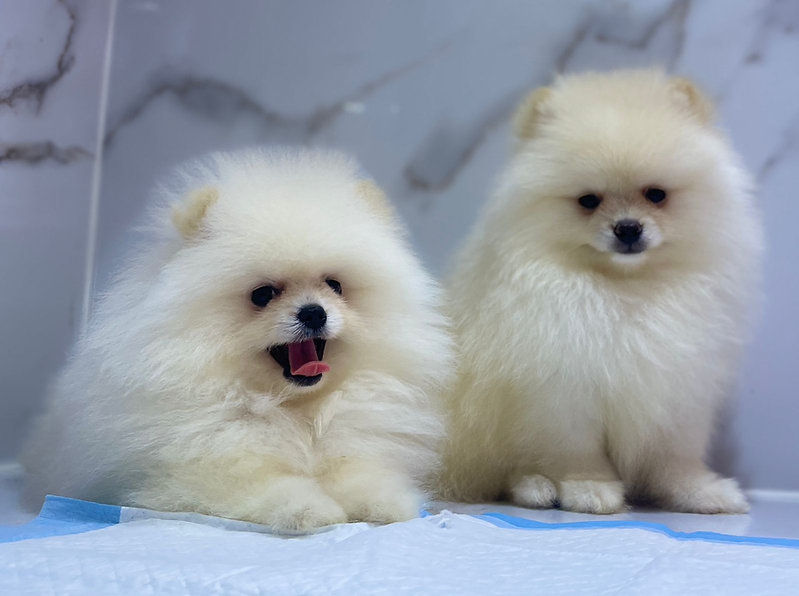"Comprehensive Guide to Buying and Caring for Pomeranian Puppies"
- Petholicks

- Feb 10, 2024
- 7 min read
Updated: Jun 14
Introduction
We will be discussing subjects like grooming, diet, training, and health of Pomeranian pups in this article. Whether you've owned a Pomeranian before or are looking to expand your knowledge, come learn about the amazing process of caring for and developing a friendship with these adorable little friends.
History
The larger Spitz-type dogs of Arctic ancestry are the ancestors of the Pomeranian breed, which originated in the Pomeran region. Their size significantly decreased because of Queen Victoria's love for them, especially her favorite, 'Windsor's Marco,' which popularised the smaller form we know today. The first Pomeranian club was founded in 1891 and established the breed standard, which increased the breed's appeal, particularly with the wealthy women of the time. Amazingly, two Pomeranians who were saved by their owners survived the 1912 Titanic catastrophe. Pomeranians, who have a rich history influenced by royal favoritism and cultural adoration, are still a popular option as companion dogs due to their small stature, endearing appearance, and loyal attitude.
Height: Males 13 - 28 cm Females 13 - 28 cm
Average weight: Males 1.8 - 2 kg Females 2.0 - 2.5 kg
Appearance
Small canines with fox-like characteristics, such as a thick, luxurious coat and a happy personality, are called Pomeranians. Their coat color matches their huge heads, oval eyes with black rims, and well-chiselled muzzles. Their powerful jaws feature a flawless scissor bite, and their short, erect ears match. Pomeranians have compact, barrel-shaped bodies and feet like cats. They also have clean shoulders, short necks, and beautiful, straight legs. Their double coat is made up of a delicate, fluffy undercoat with a noticeable "frill" around the neck and a long, flat outer layer. They are available in several hues, such as sable, orange, cream, and black. White-coated Poms must be mostly white with very little variance allowed; cream-coated Poms have black noses and eye rims.
Temperament
Pomeranians are most suited for seasoned owners because they develop close ties with their single companion; however, families or novices may find them less acceptable. Despite their intelligence and extroversion, they need early and continuous training to control their assertiveness. Socialization is essential to avoid problems with dominance, and when they engage with other dogs, they might not notice how small they are. They do best in homes where someone is around a lot because they are prone to separation anxiety. Even though they are little, they have a strong desire to hunt and, if not trained otherwise, may bark excessively. They are playful throughout their lives and take pleasure in entertaining their owners. Although they can adapt to a variety of living conditions, their size makes them cautious near water. Their diminutive size makes them ineffective watchdogs, even though they are attentive.
Intelligence
Despite their intellect and eagerness to learn, Pomeranians can be unpredictable. Training must be fair and consistent, and establishing leadership requires firm hands. Poms love to vocalize, therefore housetraining takes persistence and should be addressed as soon as excessive barking occurs. Establishing limits and preventing "small dog syndrome" need early instruction in basic commands. For Pomeranian puppies, the essential commands are sit, stay, come, down, leave it, and bed. Commencing early guarantees that they comprehend regulations and promotes their flexibility and general conduct. Despite their sporadic unpredictable nature, Pomeranians can make excellent companions if given enough time and regular training.
Health issues
Pomeranians can live up to 16 years if they have the right care and food. Among toy breeds, they are well-known for their hardiness and have minimal inherited health problems. The breed is prone to luxating patella, tracheal collapse, dental issues, and Chiari-like deformity. In addition, Pomeranians can have cataracts, distichiasis, hypothyroidism, poor fontanel closure, black skin illness (alopecia X), which prevents afflicted dogs from reproducing, and cataracts. As part of KC Breed Watch standards, championship judges have been required to evaluate fontanel closure since 2014. The general health and lifespan of Pomeranians are preserved by vigilant health monitoring and conscientious breeding techniques.
Spaying and neutering?
A female Pom can be spayed when she is 6 months old. Male Pomeranians can be neutered when they are 6 months old which is typically when both testicles have dropped into their scrotums.
Supervet Pet Clinic Dubai is well known for being the best place in town to get pet care. Their outstanding services include every facet of pet health, making them the best option for wellness checks, dental work, vaccinations, spaying, neutering, and microchipping. Modern facilities and a committed staff of veterinarians enable Supervet to provide the best treatment possible for animal friends. They place a high priority on prophylactics, providing full vaccines to protect animals from illness. Furthermore, the control of pet populations and general well-being are facilitated by their proficiency in spaying and neutering procedures. While routine wellness examinations keep an eye on your pet's general health, dental care services are concentrated on keeping their mouths healthy. By guaranteeing that pets can be quickly identified and returned to their owners in the event of a loss, microchipping services offer peace of mind.
Caring for Pomeranian Puppies: Essential Tips for New Owners
For optimum health, Pomeranians need regular grooming, exercise, and a balanced diet. Because of their small size, a small playpen can help minimize accidents in the house, which is why puppy-proofing is so important for their protection. Even though Pomeranian puppies are lively, they require a lot of sleep—up to 21 hours each day. It's critical to have a regular feeding plan and progressively increase adult feeding frequency. Do not spoil puppies to avoid problems with dominance. A puppy needs the following essentials: a playpen, a suitable dog bed, a harness, and lead, toothpaste and toothbrush made specifically for dogs, and a bowl of water. Since Pomeranian puppies are sensitive to loud noises, it's critical to maintain a quiet environment. Puppies of Pomeranian breeds are guaranteed a pleasant and healthy beginning with responsible care and a loving environment.
Grooming
Pomeranians require frequent grooming due to their thick double coat. To avoid matting, especially during the spring and fall shedding seasons, they need a complete grooming session once a week in addition to brushing every other day. pleasant grooming experiences guarantee puppies have a pleasant perception of grooming. Regular grooming involves cleaning the ears and nails and using a gentle cloth to remove any stains left by tears. Oral hygiene in dogs requires brushing their teeth twice a day with toothpaste designed for dogs. Getting them used to having their feet, ears, and other body parts touched will make check-ups easier as they become older, including whether to cut their nails. Regular grooming guarantees the Pomeranian's general health and well-being in addition to maintaining their attractive appearance.
Exercise
Poms don't require a lot of activity because they are small dogs, but they do need to go outside for at least half an hour each day. If the fencing is secure, they also like exploring a rear garden whenever they get the chance to be off their leads in a comfortable and safe setting. Given that their joints and bones are still growing, young Pomeranian puppies shouldn't be very active. Poms who receive a lot of exercise while they are young run the risk of having their joints and bones overworked, which could cause issues for the dog down the road.
Petholicks: Your Top Choice for Pomeranian Puppies
Being the best pet store, Petholicks distinguishes itself by providing unmatched quality and care for cherished animals. Petholicks guarantee an outstanding experience for both owners and their pets via an uncompromising dedication to excellence. The best place to look when thinking about getting a Pomeranian for your house is Petholicks. Their wide range of Pomeranian puppies is carefully chosen, ensuring that each puppy is healthy, socialized, and has a pedigree.
In addition to having an amazing collection, Petholicks places a high value on ethical breeding methods to protect the health of its animals. Their experienced staff helps potential owners make well-informed decisions about their new furry family member by offering important advice. Petholicks is a reliable provider of high-quality grooming services, and lifelong care, from puppyhood to adulthood.
Conclusion
To sum up, Pomeranian pups are vibrant and cute pets who need the right care and attention to grow and develop. For their well-being, responsible ownership is crucial, encompassing everything from grooming and dental care to socialization and training. By attending to their unique requirements and potential health hazards, like dental problems and "small dog syndrome," owners can help their Pomeranian puppy develop a deep bond and have a happy, long-lasting relationship. Pomeranian puppies may develop into contented, self-assured adults with commitment and love, providing happiness and company to their families throughout their lives.
FAQS
What is the average lifespan of a Pomeranian puppy?
Pommerians can live up to 16 years if given the right upbringing and diet.
How often should I groom my Pomeranian puppy?
To avoid matting, especially during shedding seasons, Pomeranian puppies should receive thorough grooming once a week in addition to brushing every other day.
What is the recommended feeding schedule for Pomeranian puppies?
Feeding should occur four times a day for Pomeranian puppies until they are comfortable in their new surroundings. You must start with the breeder's feeding schedule and work up to adult feeding frequency.
Are Pomeranian puppies prone to dental problems?
Yes, giving Pomeranian puppies dental care is essential. Brushing your dog's teeth every day using toothpaste designed for dogs is essential to lower the risk of dental issues.
What is "small dog syndrome," and how can I prevent it in my Pomeranian puppy?
The term "small dog syndrome" describes the behavioral problems that can develop in small dogs that are overindulged or improperly trained. Setting limits, giving regular training, and avoiding rewarding bad behavior are all crucial for Pomeranian puppies.
What are common health issues in Pomeranian puppies?
Puppies of Pomeranians may be susceptible to diseases such as luxating patella, dental problems, collapsed trachea, and alopecia x (black skin disease). Regular veterinary examinations and conscientious breeding methods can help reduce these health issues.
How much exercise does a Pomeranian puppy need?
Pomeranian puppies have moderate activity requirements in comparison to larger breeds, but they still need to exercise every day to keep healthy and fit.








Comments